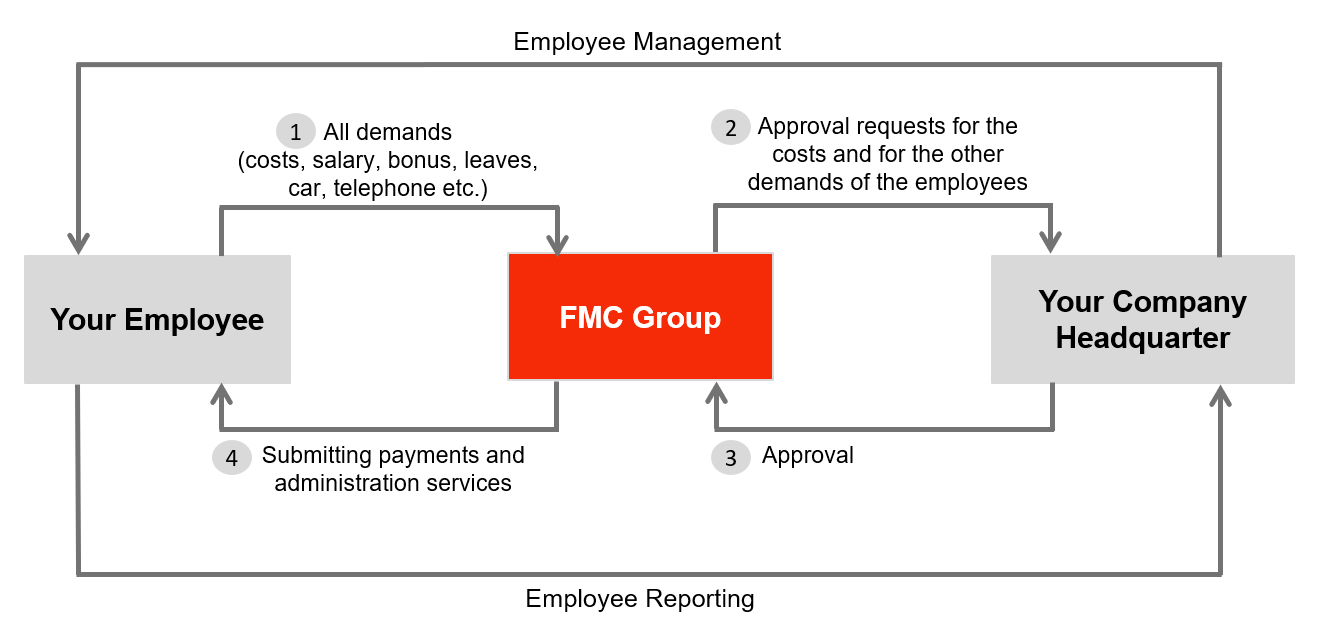
Employer of Record USA
Our Employer of Record USA service enables clients to hire employees without the need to operate a local legal entity there.
It makes a big difference to develop a new market with your own personnel on the ground. Particularly for functions related to sales & marketing, business development, distributor management, and service & maintenance, our customers are very satisfied using our USA Employer of Record Service.
Our customers and their local teams can be free of the distractions of administrative tasks and complex local requirements. So you can fully focus on the development of your core business.
If your local business grows large enough, you can easily transfer the employees to your own subsidiary. It also provides a quick exit strategy if necessary. In addition to USA, we offer Employer of Record services in several other countries.
Content:
- Employer of Record USA – FMC Group’s Approach
- Hiring an Employee
- Income Tax
- Typical Benefits
- Visa for the Employees
- Time off Policies
- Terminating an Employee

Get in touch with us

Employer of Record USA - FMC Group's Approach
- Quick, flexible, and easy entry into USA in compliance with local employment laws
- Complete control over business development with your own team
- Good option for building up, managing, and supporting your distributors and key accounts by directly observing local developments and adjusting the strategy whenever necessary
- Using our comprehensive recruitment experience for international clients, we can form a local team that fits your corporate culture.
- Focusing on your core business instead of dealing with the time-consuming and complex local administrative tasks
- Allowing for easy market exit if necessary
- Integrating your employees into our team through motivational events and special meetings
EOR USA Management & Reporting Flow

Hiring in USA
Employment laws in the United States exhibit significant variations from state to state, often entailing adjustments to overarching federal regulations. Consequently, the documentation and compliance requirements within the US are extensive.
Employment Contract – indefinite vs. fixed term
Many companies prefer hiring contract workers over full-time employees because it frees them from providing certain benefits like health insurance, vacation time, and 401(k) matches.
Contractors, also known as freelancers or independent workers, are typically hired for specific projects or periods instead of being offered permanent roles with perks. They could be individuals, limited liability companies, or limited liability partnerships engaged by businesses for short or long durations. Unlike full-time employees, contractors aren’t tied to one company legally. They have the flexibility to work with multiple companies as long as they meet their deadlines. Labor laws in the United States treat full-time employees and contract workers differently.
Probation Period
The probationary period should be limited to a maximum of 60-90 days.
Work Week, Overtime & Maximum Working Hours
The standard work week in the U.S. consists of 40 hours. According to federal law, eligible employees must be compensated at a rate of 1.5 times their regular pay for any hours worked beyond 40 in a workweek. Additionally, employers might be required to pay overtime to employees who exceed a certain number of hours in a single workday, typically more than 8 or 12 hours, depending on the state’s regulations.
State laws may also stipulate that employees are entitled to a higher rate of pay, exceeding 1.5 times their regular rate, once they have worked a certain threshold of overtime hours.
Income Tax
Individual income is taxed at both the federal and state levels.
Federal income tax rates range from 10% to 37%.
Social Security contributions for employees range from 7.65% to 8.55% of their salary, including:
6.2% for OASDI on income up to USD 147,000.
1.45% for Medicare.
An additional 0.9% for Medicare on income exceeding certain thresholds.
Typical Benefits
- Health Insurance: Employers often provide health insurance coverage for employees, which may include medical, dental, and vision plans.
- Retirement Plans: Many companies offer retirement savings plans such as 401(k) plans, where employees can contribute a portion of their salary, often with employer matching contributions.
- Life Insurance: Employers may offer life insurance coverage to employees, providing financial protection to their families in case of death.
- Commuter Benefits: Companies may provide commuter benefits, such as pre-tax deductions for public transportation expenses or subsidies for parking costs.
Visa for the Employees
A work permit in the United States is granted by USCIS (U.S. Citizenship and Immigration Services). It serves as an identification card confirming an individual’s authorization to work in the United States. Processing times for a USA work permit for foreigners vary depending on the location of processing and the type of work permit. It may take several days to complete.
It’s worth noting that it’s possible to obtain a USA work permit without a job offer through visas such as EB-5, O-1, and EB-1.
- Employment-based green cards refer to permanent residency status granted to individuals based on their employment or job offer in the United States. These green cards are typically sponsored by employers who demonstrate the need for the skills or expertise of the foreign worker. There are several categories or preference levels (EB-1, EB-2, EB-3, etc.) within the employment-based immigration system, each with its own eligibility requirements and processing procedures. These green cards allow recipients to live and work permanently in the United States and eventually pursue citizenship if they meet the necessary criteria.
- The NAFTA-based visa, also known as the TN visa, is a non-immigrant visa category available to citizens of Canada and Mexico. It allows them to work in the United States in certain professional occupations that are listed under the North American Free Trade Agreement (NAFTA). This visa category facilitates the temporary entry of professionals for specific job roles without the need for the traditional H-1B visa process. The TN visa requires applicants to meet specific educational and professional qualifications related to the occupation they intend to work in.
- Temporary work visas are classified according to the individual’s professional background and the nature of employment. They encompass various categories such as business visitor visas, investor visas, and temporary skilled worker visas. These categories cater to different needs and qualifications, providing options for individuals seeking temporary employment opportunities abroad.
- The L-1 visa is a non-immigrant visa category that allows multinational companies to transfer certain employees from their foreign offices to their offices in the United States. There are two types of L-1 visas: L-1A for managers and executives, and L-1B for employees with specialized knowledge
Time off Policies
Public Holidays
In the United States, employers have the flexibility of deciding the working status of their employees on a public holiday. If the employer desires, they can instruct their employees to work on holidays without paying them a holiday or overtime fee.
In the United States, public holidays can vary depending on the state, but there are several federal holidays observed nationwide
- New Year’s Day – January 1st
- Martin Luther King Jr. Day – Third Monday in January
- Presidents’ Day (Washington’s Birthday) – Third Monday in February
- Memorial Day – Last Monday in May
- Independence Day – July 4th
- Labor Day – First Monday in September
- Columbus Day – Second Monday in October
- Veterans Day – November 11th
- Thanksgiving Day – Fourth Thursday in November
- Christmas Day – December 25th
Annual Leave
Under U.S. law, employers are not mandated to provide paid time off for vacations or holidays to their employees. Nevertheless, many companies typically offer a range of 10 to 20 days of paid time off (PTO) annually as part of their benefits package.
Sick Leave
Many states and local jurisdictions have enacted their own laws mandating paid sick leave for employees. These laws often outline requirements such as accrual rates, usage, and employee eligibility. Some states also allow for paid sick leave to be used for the care of family members.
Employers in the U.S. may also choose to offer paid sick leave voluntarily as part of their benefits package. The amount of sick leave offered, accrual rates, and eligibility criteria can vary widely among employers.
Terminating an Employee
In the United States, labor law allows for “at-will” termination, enabling employers to dismiss employees at their discretion, without needing a specific reason, as long as it’s not unlawful, such as due to discrimination or whistleblowing. Neither employers nor employees are obligated to follow a notice period when ending employment.
Severance pay isn’t mandatory unless stipulated in the employment contract or relevant collective agreement. Many businesses decide on severance based on the employee’s tenure with the company.
Disclaimer: Although we carefully researched and compiled the above information, we do not give any guarantee with respect to the actuality, correctness, and completeness.
